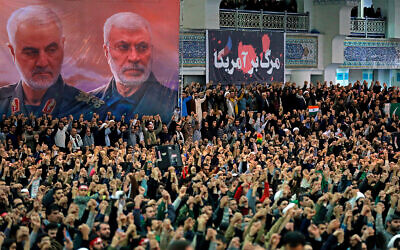 DUBAI, United Arab Emirates (AP) — Even as both face the same invisible enemy in the coronavirus pandemic, Iran and the United States remain locked in retaliatory pressure campaigns that now view the outbreak as just the latest battleground.
DUBAI, United Arab Emirates (AP) — Even as both face the same invisible enemy in the coronavirus pandemic, Iran and the United States remain locked in retaliatory pressure campaigns that now view the outbreak as just the latest battleground.
Initially overwhelmed, Tehran now seeks to sway international opinion on US sanctions by highlighting its struggles with COVID-19, the illness caused by the virus. Iran asked for $5 billion from the International Monetary Fund even as it enriches uranium beyond the limits of its 2015 deal with world powers.
The US, which unilaterally withdrew from the deal in 2018 under President Donald Trump, insists that aid can reach the Islamic Republic — though humanitarian organizations say Washington’s sanctions disrupt even permitted trade.
At the same time, the US is now withdrawing troops from Iraqi bases, redeployments it insists are pre-planned even as Trump alleges Iran plans “a sneak attack” against them.
The risk of open conflict between the countries is overshadowed by the pandemic. Yet it persists — some say at levels as high as immediately after the January drone strike by the US that killed Iranian Gen. Qassem Soleimani in Iraq.

Worshipers in Iran chant slogans during Friday prayers ceremony by a banner showing slain Iranian Revolutionary Guard general Qassem Soleimani, left, and Iraqi Shiite senior militia commander Abu Mahdi al-Muhandis, who were killed in Iraq in a US drone attack on January 3, and a banner which reads in Persian: ‘Death To America,’ at Imam Khomeini Grand Mosque in Tehran, Iran, January 17, 2020. (Office of the Iranian Supreme Leader via AP)
“After Soleimani’s killing, everybody thought there will be war, but nothing happened,” said Mahsa Rouhi, a research fellow at the International Institute for Strategic Studies. “Whereas we were so close to war that it’s not that nothing happened. And we are not back to normal. … We are back to a situation where any move could easily escalate into a conflict.”